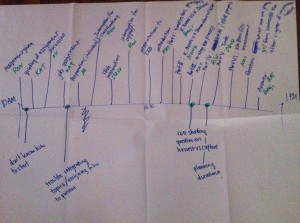A couple of weeks ago I was the fictitious CEO of a global insurance group listening to a presentation by a combined group of Russian and Thai delegates at a training programme. Their task was to convince me that my company should engage them and to do so they had to demonstrate knowledge and understanding of the approach they’d spent the previous 4 days learning about.
They had a few rules to adhere to:
- The presentation was to last for a maximum of 50 minutes and minimum 25 minutes
- Each person had to present for at least 5 minutes and no more than 10 minutes
Those familiar with both cultures will know that one is voluble and will openly debate, happy to occupy centre stage; the other more reserved preferring offline conversations with an aversion to open criticism. After lunch my challenge was to conduct a debrief on this exercise with the group drawn from consulting and energy with a good to acceptable command of English.
I settled on using a timeline as a way of giving both groups a neutral object on which to focus. I was trying to get them to recognise how differently groups from varied backgrounds and cultures can view the same exercise while concurrently acknowledging their very positive actions as a group.
using a timeline as a catalyst for coming to an understanding about an event
Here’s the instructions I used:
- Please split into two groups Russian Team and Thai Team and take 15 minutes to:
- draw a timeline: from handing over to presentation
- now trace the steps and the chronology, noting down key moments/decisions as you saw them and who was involved
- were there any moments the group got stuck and if so how did you overcome them?
- when you’ve completed your sheet put it up on the wall
- then inspect the other team’s and note down any obvious differences
A key request was that ‘above the line’ they should record the key moments and ‘below the line’ the sticky (or difficult) moments.  The Thai team with their energy (engineering) background created a detailed forensic account whereas the Russian Team provided summaries for each of the headings above. The group found it very useful to discuss the difference in approach and outputs since it has real implications on the way to roll out new initiatives in a global organisation.
The Thai team with their energy (engineering) background created a detailed forensic account whereas the Russian Team provided summaries for each of the headings above. The group found it very useful to discuss the difference in approach and outputs since it has real implications on the way to roll out new initiatives in a global organisation.
There was a lot of laughter (a good sign) when I invited them to split 50/50 Russian/Thai in pairs. I invited them to
- Get into pairs and discuss
- What is something that worked well in this activity?
- What is something that did not work well in this activity?
- What is something you would do differently next time?
- And finally, what behaviours did you find most helpful as you worked in a team for the first time.
- Back into plenary and capture each person’s comments.
Once we’d surfaced positive behaviours it enabled me to split the ‘teams’ and as a mark of progress I asked the listener to repeat back what their partner had said.
my takeaways
The formality of the timeline allowed both cultures to fully participate in their own way and gave the less voluble Thais a mechanism to voice their feelings which otherwise might have remained hidden.
It re-emphasised the maxim that in a global business tailoring your messages to each audience is critical to get adoption.
And finally it underscored the idea that when undertaking a debrief it is important to always recognise and acknowledge the good behaviors that others adopt.

Thank you Paul for an excellent post. This is a very important aspect to be aware of when working in a global context to understand what is important for different cultures/ nationalities and to accomodate those differences to enhance, help & support collaboration and innovation .
Thank you very much Paul for this activity. It was very useful.
Since it was the first time we’ve worked together as a team, first of all, we had to overcome the cultural barriers to start sharing our ideas and thoughts. It made me realise once again the importance of cultural awareness and benefits of cultural diversity. In order to collaborate effectively and successfully in a multicultural environment and to make better decisions, it is important to not deny or criticise other people ideas, but listen carefully and try to get the best of it.
I think we had a great example of this during the debrief. As a result of our collaboration and knowledge sharing we could create a timeline that would be more clear and complete. The debrief has helped us to share our ideas and better understand each other, as well as learn a lesson from the exercise we have been given. With your permission I will definitely use it for my current and future projects.
Katerina thanks for the feedback. And yes feel free to reuse with one caveat: please feed back any learnings that emerge. Paul
Thank you Paul. I will be happy to share ideas and learnings.
What a wonderfull article.
I was suprised how with a simple excercise, do a timeline, a common practice in business, you will be able to understand and manage cultures and diversity.
Camilo thanks for the kind words. It would work effectively as well I believe with groups who have different aspirations and expectations – I am thinking of the discussion we had in your offices last year.
Thanks again for taking the trouble to post a comment.
Paul